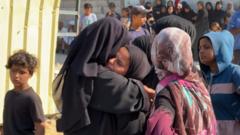Israel has implemented measures aimed at addressing the humanitarian crisis in Gaza amid escalating global condemnation of its actions, particularly concerning reports of starvation. The Israel Defence Forces (IDF) has begun allowing airdrops of aid, including its first drop overnight, and permitted the United Arab Emirates air force to conduct further deliveries. This initiative, framed as an emergency humanitarian response, has drawn mixed reactions. Hamas has dismissed these efforts as a façade, claiming Israel is attempting to rehabilitate its global image.
Israel's Humanitarian Measures amid Gaza Starvation Crisis

Israel's Humanitarian Measures amid Gaza Starvation Crisis
In response to rising international criticism over the humanitarian crisis in Gaza, Israel announces new aid measures.
Despite ongoing military operations, including recent airstrikes amidst declared "tactical pauses," Israel maintains its stance that it is not culpable for the humanitarian disaster in Gaza. However, criticism has been intensifying from allies such as Britain, France, and Germany, urging Israel to lift restrictions on aid and adhere to international humanitarian laws. These countries accuse Israel of creating the conditions leading to starvation, and demand comprehensive measures to alleviate suffering.
The IDF's introduction of the Gaza Humanitarian Foundation (GHF) to oversee aid distribution has been met with skepticism from the United Nations, which views the GHF as militarized and ineffective. The UN has highlighted the tragic toll on civilians, with reports suggesting over 1,000 Palestinians killed while searching for food as access to aid remains tightly controlled. Humanitarian officials emphasize that merely airdropping supplies is insufficient to address the dire needs of the population, calling for a long-term ceasefire and a substantial aid effort without restrictions.
Concerns were further amplified by statements from Jonathan Whittall of the UN's humanitarian office, who characterized the crisis as unprecedented. He underscored that achieving any real improvement in conditions in Gaza would depend on allowing safer transit routes for aid and providing guarantees for the safety of civilians. Meanwhile, key Israeli leaders face scrutiny from the International Criminal Court over accusations related to the exacerbation of the humanitarian crisis.
As air dropped supplies travel to Gaza, they are perceived as a temporary solution failing to reach the true scale of the need on the ground. Aid delivery from the air has been criticized throughout history as a last resort, proving inadequate compared to coordinated land operations. The historical context of such measures raises significant concerns about their effectiveness in resolving the present humanitarian emergencies in Gaza. The emphasis remains on the need for a lasting resolution to the conflict, permitting unrestricted access for humanitarian support to prevent further deterioration of living conditions.
As the situation unfolds, the potential for lasting change remains uncertain, as humanitarian groups continue to call for immediate and comprehensive actions to address the mounting crisis in Gaza.
The IDF's introduction of the Gaza Humanitarian Foundation (GHF) to oversee aid distribution has been met with skepticism from the United Nations, which views the GHF as militarized and ineffective. The UN has highlighted the tragic toll on civilians, with reports suggesting over 1,000 Palestinians killed while searching for food as access to aid remains tightly controlled. Humanitarian officials emphasize that merely airdropping supplies is insufficient to address the dire needs of the population, calling for a long-term ceasefire and a substantial aid effort without restrictions.
Concerns were further amplified by statements from Jonathan Whittall of the UN's humanitarian office, who characterized the crisis as unprecedented. He underscored that achieving any real improvement in conditions in Gaza would depend on allowing safer transit routes for aid and providing guarantees for the safety of civilians. Meanwhile, key Israeli leaders face scrutiny from the International Criminal Court over accusations related to the exacerbation of the humanitarian crisis.
As air dropped supplies travel to Gaza, they are perceived as a temporary solution failing to reach the true scale of the need on the ground. Aid delivery from the air has been criticized throughout history as a last resort, proving inadequate compared to coordinated land operations. The historical context of such measures raises significant concerns about their effectiveness in resolving the present humanitarian emergencies in Gaza. The emphasis remains on the need for a lasting resolution to the conflict, permitting unrestricted access for humanitarian support to prevent further deterioration of living conditions.
As the situation unfolds, the potential for lasting change remains uncertain, as humanitarian groups continue to call for immediate and comprehensive actions to address the mounting crisis in Gaza.


















